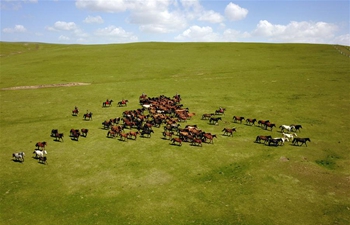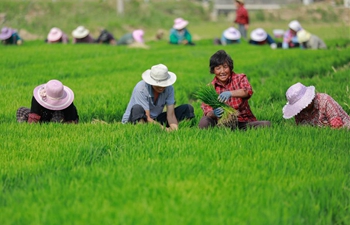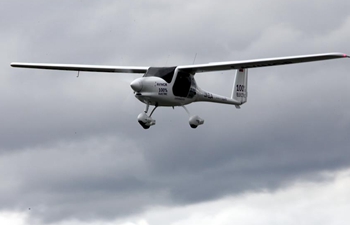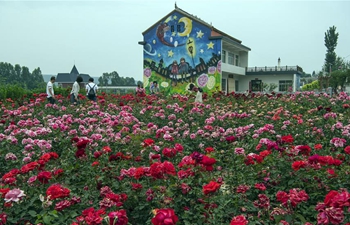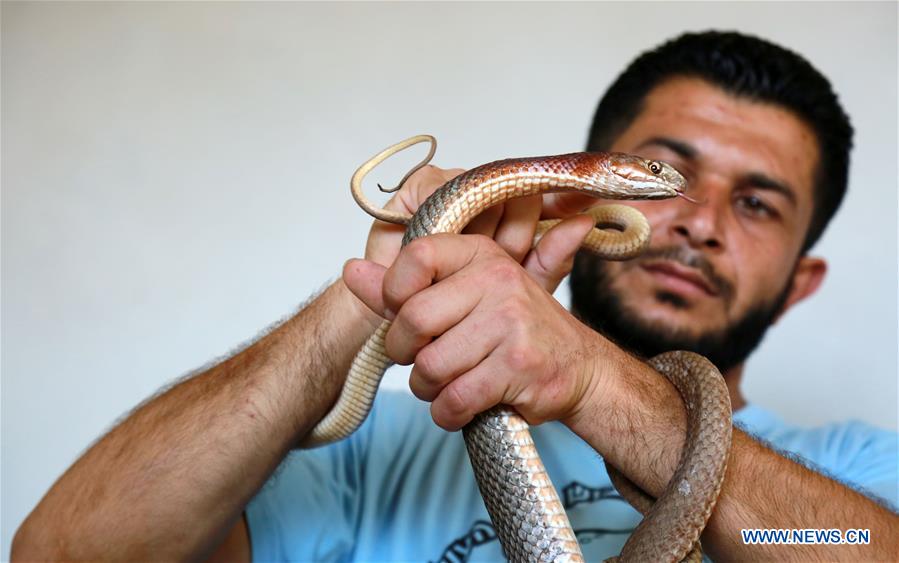
Abdul-Fattah Assaliya holds a snake in his house in the northern Gaza town of Beit Lahiya, on June 20, 2018. Abdul-Fattah Assaliya, a 32-year-old man in the Palestinian enclave of the Gaza Strip, spends most of his time every day caring for the 35 snakes at his home. (Xinhua)
GAZA, June 22 (Xinhua) -- Abdul-Fattah Assaliya, a 32-year-old man in the Palestinian enclave of the Gaza Strip, spends most of his time every day caring for the 35 snakes at his home.
Assaliya, who lives in the northern Gaza town of Beit Lahiya, is neither an expert in reptiles research, nor an owner of a snakes farm.
Raising snakes is just his natural hobby, which he has developed since childhood.
"I started to raise snakes almost 15 years ago ... I found out that these creatures are lovely and I deal with them without any fears," he told Xinhua.
But for a construction worker earning a meager salary and a father of four, it is really not a cheap hobby to raise the pet snakes.
Assaliya uses one of the three rooms inside his apartment for raising the reptiles of different colors and sizes.
"I raise them in glass boxes so they will not escape," Assaliya said as he fed a baby snake he recently caught in a nearby farm.
Assaliya explained that the snakes require warm temperature and an appropriate condition to survive, which he has been trying hard to provide.
Of course, Assaliya cannot afford to buy meats or small animals to feed his beloved snakes.
"I resort to catching small mice, lizards, frogs and small reptiles to provide food for the snakes," Assaliya said, while placing plastic sheets around the glass boxes to keep the snakes warm.
He explained that some snakes eat once a week, and may eat once a month in winter. This certainly helps ease the burden on him to sustain his hobby.
But another challenge, Assaliya explained, is the frequent power outages in Gaza due to the Israeli blockade, which threaten the lives of his snakes as they need the warmth to survive.
There are 34 species of snakes in Palestine, out of which about nine are highly venomous.
So far, Assaliya has collected 15 out of the 34 species of snakes, including the Palestine viper, the most common venomous snake in the Middle East.
He hopes he could collect all the species of snakes in Palestine and have enough resources to raise more snakes.
Assaliya said he caught most of the snakes in the nearby agricultural areas and farms.
"Farmers call me whenever they find a snake ... I just go and catch it," he said with a smile.
Although it is dangerous, or even fatal, to touch snakes, Assaliya teaches his four children how to deal with them properly.
"I love snakes, but I only touch them in the presence of my father," Assaliya's six-year-old daughter Yousra told Xinhua as she observed a snake moving inside a glass box.
The little girl knows the types of snakes her father raises and which of them is the most dangerous.
"I fear the poisonous ones, but I ask my father to feed them sometimes," she added.
Assaliya said he is always available to help people who find snakes at their homes or fields, adding that he wants to save both, people and snakes.
"People always kill snakes and the government here is not doing much to save people and snakes ... I take this role in the area where I live," Assaliya said.






